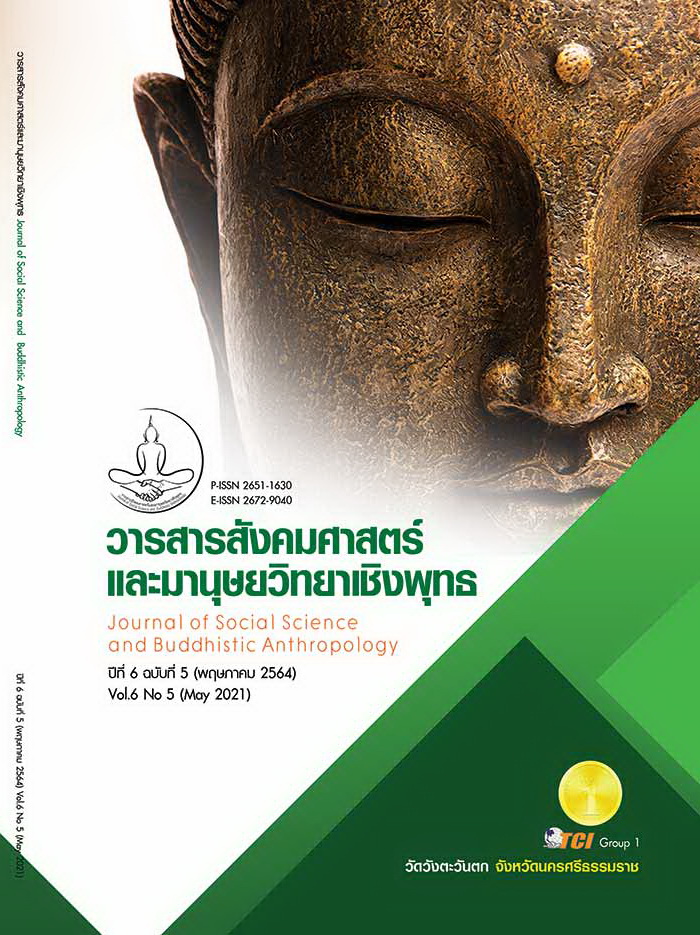SOCIAL HELPING BEHAVIOR DURING THE COVID - 19 CRISIS OF WORKING AGE POPULATION IN BANGKOK
Keywords:
Social Helping Behavior, COVID - 19, Working Age PopulationAbstract
The Objectives of this research article were to 1) study social helping behavior during the COVID - 19 crisis of working age population in Bangkok and 2) explore factors influencing social helping behavior during the COVID -19 crisis of working age population in Bangkok. Quantitative research was done with data collected by online questionnaires. 1,200 samples were Bangkok residents over 20 years old. The data was analyzed by descriptive statistics and multiple regression analysis (enter method). Results were that during the COVID - 19 crisis, the working age population in Bangkok demonstrated a moderate level of overall social helping behavior. 73.00 percent of samples displayed social helping behavior by donating or sharing items, while 52.75 percent offered encouragement or useful opinions to others, and 49.92 percent provided physical help. In addition, population factors including residential areas and religion influenced sharing behavior. Factors influencing overall social helping behavior included social capital, helping model, experience of suffering, pressures caused by COVID - 19, and motivation to help. This research results are useful for understanding the social helping behavior and factors influencing the social helping behavior during the COVID - 19 crisis of working age population in Bangkok and may be used as guidelines for policy formulation to promote human capital, social capital, and citizenship development through social helping behavior roles among the Thai population.
References
ณัฐณิชากร ศรีบริบูรณ์. (2550). การพัฒนาโมเดลเชิงสาเหตุของจิตอาสาของนักเรียนมัธยมศึกษาตอนปลาย ในโรงเรียนสังกัดสำนักงานคณะกรรมการการศึกษาขั้นพื้นฐาน. ใน วิทยานิพนธ์ครุศาสตรมหาบัณฑิต สาขาการวิจัยการศึกษา. จุฬาลงกรณ์มหาวิทยาลัย.
เติมศักดิ์ คทวณิช. (2549). จิตวิทยาทั่วไป. กรุงเทพมหานคร: บริษัท ซีเอ็ดยูเคชั่น จำกัด (มหาชน).
นราเขต ยิ้มสุข. (2561). โมเดลความสัมพันธ์เชิงสาเหตุของผลการปฏิบัติงานของอาสาสมัครแรงงาน. วารสาร HR Intelligence, 13(1), 79-98.
นันทพร ไม้ทองดี และนาตยา แพ่งศรีสา. (2562). พฤติกรรมการบริจาคเงินเพื่อการกุศลของผู้สูงอายุในอำเภอเมืองนครสวรรค์ จังหวัดนครสวรรค์. วารสารวิทยาการจัดการปริทัศน์, 21(2), 107-117.
ผู้จัดการออนไลน์. (2563). ตู้ปันสุข จากคำปรามาส สู่เทรนด์ใหม่การปันน้ำใจช่วยผู้ยากไร้ช่วงโควิด-19. เรียกใช้เมื่อ 11 พฤษภาคม 2563 จาก https://mgronline.com/travel /detail/9630000048681
พระครูพิลาศสรกิจ และคณ. (2562). ศึกษาวิเคราะห์การให้ทานในสังคมไทยยุคปัจจุบัน. วารสารรมหาจุฬานาครทรรศน์, 6(5), 2302-2315.
สยามรัฐออนไลน์. (2563). เปิดไทม์ไลน์ต้นตอโควิดโลก-โควิดไทย. เรียกใช้เมื่อ 20 เมษายน 2563 จาก https://siamrath.co.th/n/148697
สำนักงานสถิติแห่งชาติ. (2563). การสำรวจสภาวะสังคม วัฒนธรรม และสุขภาพจิต พ.ศ. 2561. เรียกใช้เมื่อ 20 มกราคม 2564 จาก www.nso.go.th/sites/2014/DocLib13/ด้านสังคม/สาขาศาสนา/ภาวะทางสังคมและวัฒนธรรม/2561/Full_report61.pdf
สำนักยุทธศาสตร์และประเมินผล. (2562). สถิติกรุงเทพมหานคร 2562. เรียกใช้เมื่อ 18 สิงหาคม 2563 จาก www.bangkok.go.th/pipd/page/sub/16647/สถิติกรุงเทพมหานคร-2562
สิทธิโชค วรานุสันติกุล. (2549). จิตวิทยาสังคม: ทฤษฎีและการประยุกต์. กรุงเทพมหานคร: ห้างหุ้นส่วนจำกัด เม็ดทรายปริ้นติ้ง.
สุวรรณี คำมั่น และคณะ. (2551). ทุนทางสังคมกับการพัฒนาทุนมนุษย์. ใน เอกสารประกอบการสัมมนาวิชาการประจำปี 2551. สำนักงานคณะกรรมการพัฒนาการเศรษฐกิจและสังคมแห่งชาติ.
อาจยุทธ เนติธนากุล และโยธิน แสวงดี. (2547). แนวคิดเพื่อการพัฒนาชุมชนในมิติพลวัตทางคนวัยทำงาน ทุนทางสังคม ทุนมนุษย์และองค์ความรู้แนวคิดทางเศรษฐศาสตร์ใหม่. วารสารสุโขทัยธรรมาธิราช, 17(1), 57-64.
Bandura, A. (1977). Social Learning Theory. New Jersey: Prentice Hall.
Best, J. W. (1981). Research in Education. New Jersey: Prentice Hall.
Cronbach, L. J. (1970). Essential of Psychological Testing. New York: Harper Row.
Degasperi, N. C. & Mainardes, E. W. (2017). What Motivates Money Donation? A Study on External Motivators. Revista de Administração, 52(4), 363–373.
Dunfield, K. A. (2014). A Construct Divided: Prosocial Behavior as Helping Sharing, and Comforting Subtypes. Front Psychol, 958(4), 1-13.
Hair, F. J. et al. (2010). Multivariate Data Analysis. London: Prentice Hall.
Jabbary, N. & Madhoshi, M. (2014). Factors Affecting Knowledge Sharing Behavior in Academic Communities: Grounded Theory International. Journal of Education and Practice, 2(6),126-136.
Jonas, K. (2012). Restoring Civil Societies: The Psychology of Intervention and Engagement Following Crisis. New Jersey: Wiley-Blackwell.
Khazanie, R. (1996). Statistics in a World of Applications. New York: HarperCollins College Publishers.
Latané, B. & Darley, J. M. (1970). The Unresponsive Bystander: Why Doesn’t He Help? New York: Appleton-Century-Croft.
Marsh, A. A. et al. (2007). Accurate Identification of Fear Facial Expressions Predicts Prosocial Behavior. Emotion, 7(2), 239-251.
Meier, S. (2006). A Survey of Economic Theories and Field Evidence on Pro‐Social Behavior. Boston: Federal Reserve Bank of Boston’s Research Center for Behavioral Economics and Decision-Making.
Milgram, S. (1970). The Experience in Living Cities. Science, 167(3924), 1461-1468.
Pelham, B. & Crabtree, S. (2008). Worldwide, Highly Religious More Likely to Help Others: Pattern Holds Throughout the World and Across Major Religions. Retrieved August 30, 2020, from https://news.gallup.com/poll/111013 /worldwide-highly-religious-more-likely-help-others.aspx
Penner, L. A. et al. (1995). Measuring the Prosocial Personality. Hillsdale New Jersey: LEA.
Sanstock, J. (2007). A Topical Approach to Life Span Development. New York: McGraw-Hill.
Stiglitz, J. E. (2012). The Price of Inequality: How Today's Divided Society Endangers Our Future. New York: W.W. Norton & Company.
Stukas, A. A. et al. (1999). Parental Helping Models, Gender, and Service-Learning. Journal of Prevention & Intervention in the Community, 18(1-2), 5-18.
Vollhardt, R. J. (2009). Altruism Born of Suffering and Prosocial Behavior Following Adverse Life Events: A Review and Conceptualization. Soc Just Res, 22(1), 53-97.
Zubairi, F. H. & Siddiqui, D. A. (2019). Factors Influencing Donation Behavior: The Role of Seasonal Effects. Retrieved August 28, 2020, from http://dx. doi.org/10.2139/ssrn 3444113









